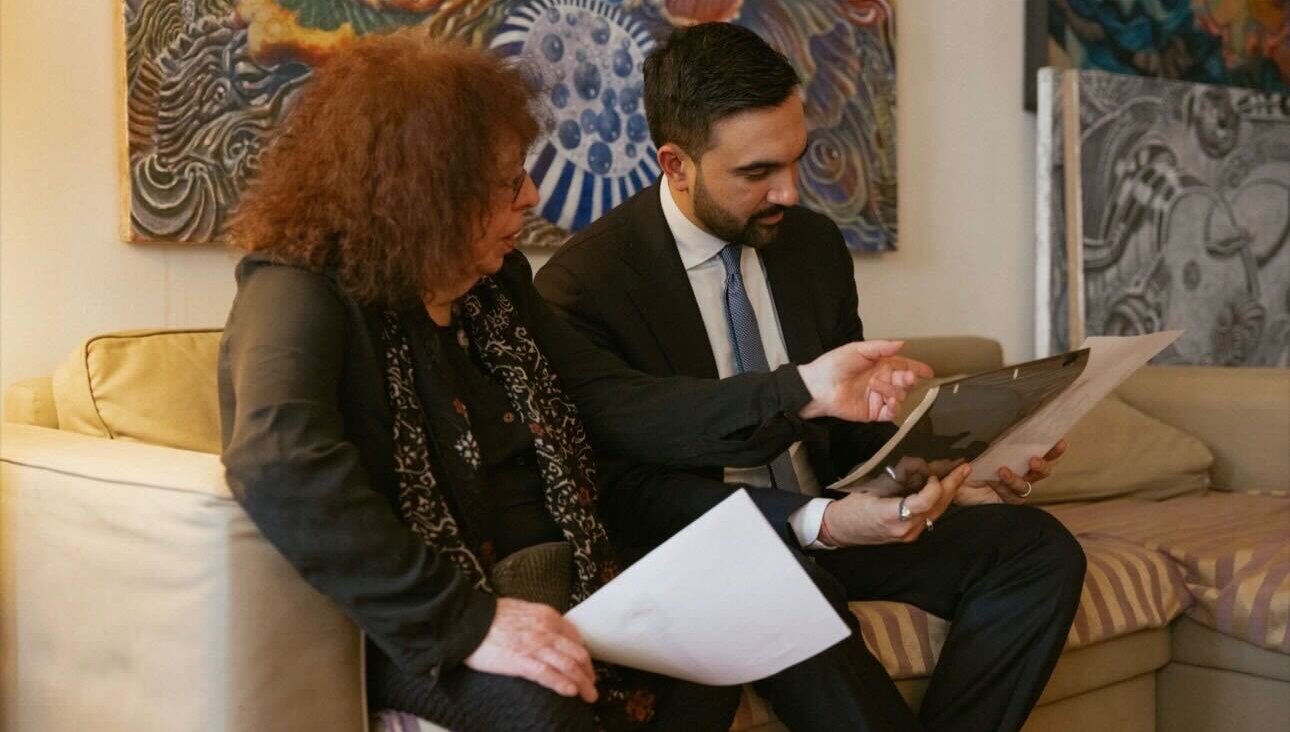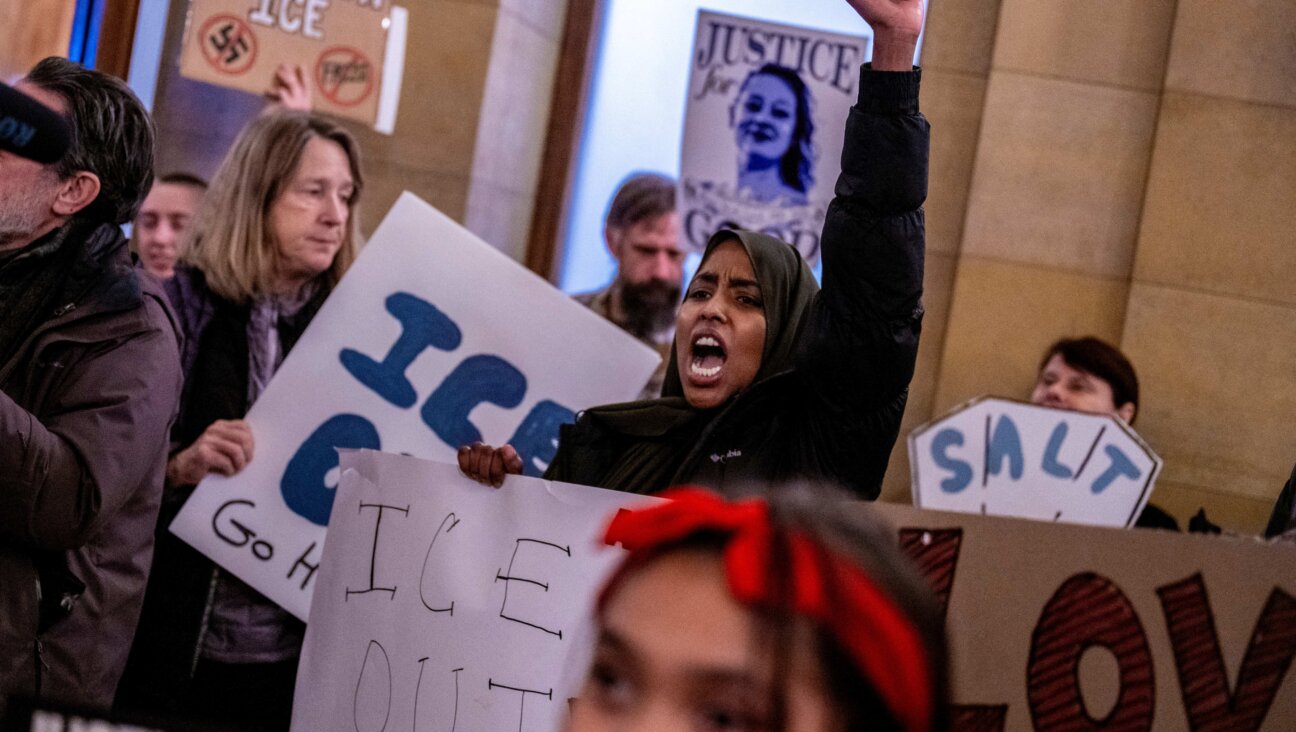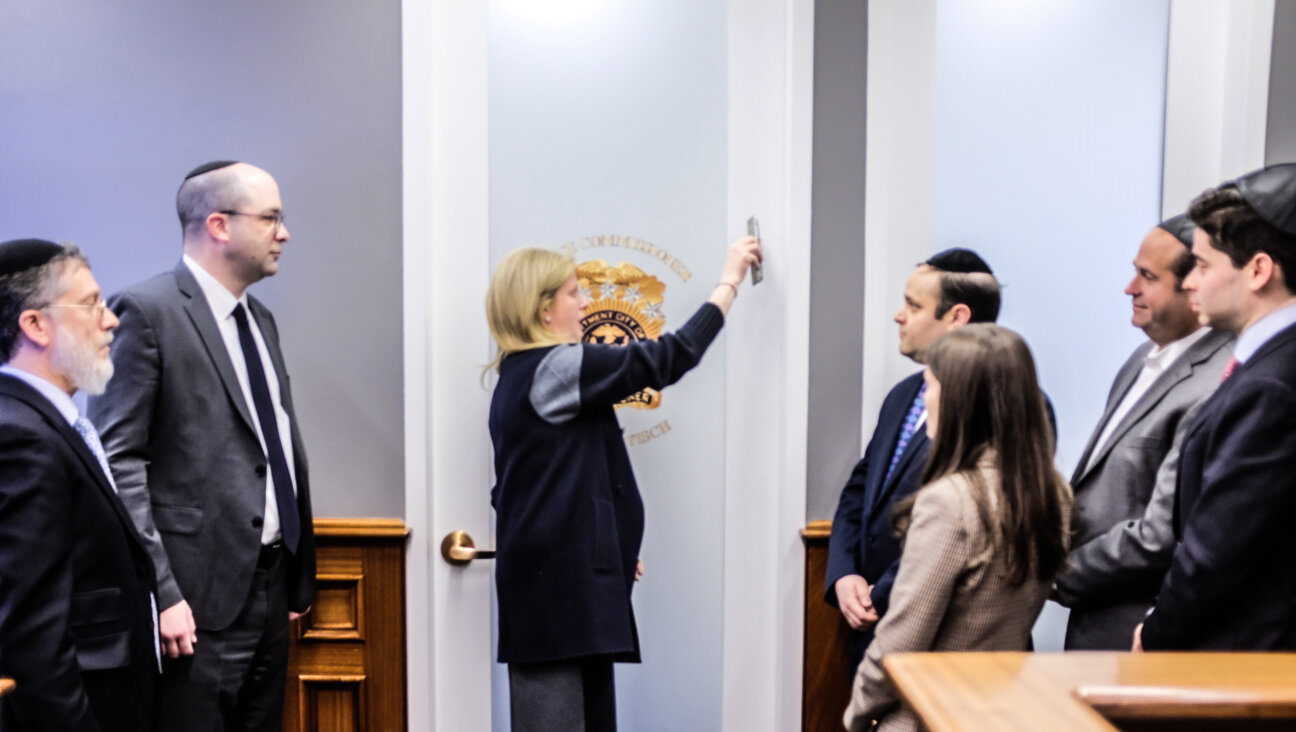I’m an American in Israel, and I feel safer here during this pandemic.

In the Israeli coastal city of Netanya, worshippers gather for prayer but maintain a required distance so as not to facilitate the spread of coronavirus. Image by Getty Images
When our heating system broke last week, my husband and I were more than eager to get the climate control fixed before we found ourselves, like thousands of Israelis, in quarantine to prevent the spread of coronavirus.
“Everyone here is only out for themselves,” said the repairman as he wrote up our bill. He was incensed, he told us, at the expense of holding multiple rounds of elections, when the money was needed to build hospitals. “They think, ‘I can sit in my house, with my food and my things, and I don’t need to think about anyone else.’”
Yet as an American in Israel on a year-long fellowship, I’m having a very different reaction to the Israeli response to coronavirus. To me, it seems that the country is pulling together much more effectively than the United States to battle the rising viral threat. Just the previous night, my father and I had discussed several reasons why that might be, such as the fact that Israelis know how to cope with impending disaster and have a general sense of a shared precarious fate. To someone who grew up in a country where individualism trumps all, it feels like Israelis are, overall, more willing to make sacrifices for the country’s survival, despite domestic and electoral infighting.
Although I’ve been in Israel since August, the truth is that I’m much more tapped into the American psyche, as demonstrated by the gap between my view of Israel’s response and my repairman’s. The media with which I engage is all in English, and while I keep up with Israeli news, I’m also receiving most of my social and traditional media and WhatsApp dispatches from America, and what I see causes me more concern for my American community than for the one I’ve found here in Israel.
As a public service during this pandemic, the Forward is providing free, unlimited access to all coronavirus articles. If you’d like to support our independent Jewish journalism, click here to make a donation.
The articles I read show a president who engaged in coronavirus denial for far too long, and people who either followed his lead and still now continue to bury their heads in the sand, or those who have read the warnings of actual scientists and are now panicking — running to the grocery store to stock up on toilet paper and discovering that the shelves are empty. This pattern reflects a greater social divide in America, representing those who believe that the United States is somehow “too great to fail” and those that have been worried since 2016 (or even earlier) that the fall of Rome is upon them, and are now behaving accordingly.
On the other hand, Israelis seem like they’re in a more secure place. Because quarantines had already been implemented before Purim, people felt generally comfortable celebrating. True, the night after Purim was more somber, because the government had announced earlier that day that schools would be closed through Passover. Emek Refaim, the main drag in Jerusalem’s German Colony, was eerily empty that night. Yet both Purim and its aftermath demonstrate that Israelis are taking cues from their government, which is directly informing them when they should worry, how they should behave and why.
This Saturday night, stricter guidelines brought on a new chapter in everyday life under coronavirus in Israel. The United States was finally starting to think about getting its act together — Israel showed once again that it was way ahead. Netanyahu addressed the country, informing Israelis of more stringent regulations, including a ban on gatherings of over ten people, shutdown of leisure establishments, and, significantly, digital tracking of confirmed coronavirus cases. Israel’s response is becoming increasingly similar to that of China and Taiwan, which are using mass surveillance to curb the virus. As an American, it gave me a moment of pause that Israel, an elected democracy, was planning to electronically and unilaterally track and publicize the citizenry’s movements; U.S. citizens learned the hard way after 9/11 that once rolled out, these sorts of measures are difficult to dial back.
As I reflect, however, on the difference between the two countries’ reactions to the pandemic, I have to think hard about a relative of mine in New York: an otherwise healthy twenty-something who came down with a fever on Friday after spending Purim with dozens of people all around the city. When he went to the doctor, they were unable to test him for COVID-19; instead, they could only confirm that he did not have the flu, and thus possibly had the virus. Because of this shocking lack of medical confirmation and comprehensive tracking, there are scores of people walking around without knowing they’d ever spent time with a potential coronavirus carrier, unable to make informed decisions.
In fact, the situation in New York is now such that public officials are warning that all New Yorkers should assume they’ve come into contact with a COVID-19 case. The individualistic American might favor taking one’s chances with the coronavirus rather than risk governmental tracking; in this case, I do not. And at the very least, the Israeli public announcement of surveillance measures, combined with the clarification that they would not be used for enforcing quarantine, provides a transparency that may boost public trust in the present moment, if not in the future.
Overall, the governmental action and communication in Israel has been organized and aggressive, willing to swiftly respond to facts on the ground, especially in comparison to the United States. You may not like who is at the wheel in Israel, but at least it feels like there’s someone driving. In America, the car seems to be careening all over the road, with people shaking their fists at each other from the sidewalk. As I sit here in my apartment, with my working heat and my two weeks’ supply of food, I don’t worry about myself.
I fear for my older and immunocompromised relatives in America; I’m anxious about the fact that Trump seems to be more concerned with pumping money into the economy than the healthcare system and at-risk populations. And while I’m troubled by the missing hospitals in Israel that could have been built with election-day funds, I’m more concerned from a practical perspective about the millions of Americans who lack health insurance or the financial security to stay home from work. While life progressively takes on a sheen of the surreal all over the world, I’m still thankful to be where I am in Israel, and I hope America can take public health lessons from better-prepared and higher-functioning countries to become a place where people can feel safe and thankful as well.
Sarah Snider is a writer and professor. She is in Israel for the year on a Dorot Fellowship.
















